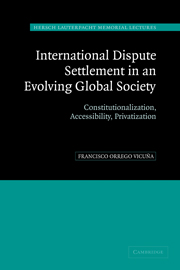 International Dispute Settlement in an Evolving Global Society
International Dispute Settlement in an Evolving Global Society Book contents
- Frontmatter
- Contents
- Preface
- Acknowledgements
- List of abbreviations
- Table of treaties
- Table of cases
- 1 An evolving international society: institutionalization, privatization, globalization
- 2 A constitutional court for an international society?
- 3 Individuals and settlement of international claims: change and adaptation of governing rules
- 4 Individuals before international courts and tribunals: a continuing progression
- 5 Shaping a new role for the individual in international dispute settlement: the contribution of specialized jurisdictions
- 6 The World Trade Organization integrated dispute settlement system: innovation and transition
- 7 An alternative dispute resolution system for international disputes
- 8 A centralized-decentralized dispute resolution system for the international community?
- Bibliography
- Index
6 - The World Trade Organization integrated dispute settlement system: innovation and transition
Published online by Cambridge University Press: 04 August 2010
- Frontmatter
- Contents
- Preface
- Acknowledgements
- List of abbreviations
- Table of treaties
- Table of cases
- 1 An evolving international society: institutionalization, privatization, globalization
- 2 A constitutional court for an international society?
- 3 Individuals and settlement of international claims: change and adaptation of governing rules
- 4 Individuals before international courts and tribunals: a continuing progression
- 5 Shaping a new role for the individual in international dispute settlement: the contribution of specialized jurisdictions
- 6 The World Trade Organization integrated dispute settlement system: innovation and transition
- 7 An alternative dispute resolution system for international disputes
- 8 A centralized-decentralized dispute resolution system for the international community?
- Bibliography
- Index
Summary
The previous chapters have shown that international society is moving towards a more centralized system of public justice, with more emphasis on what can properly be described as “constitutional” issues. At the same time, a degree of decentralization may be noted: this takes the form of direct access of individuals to international courts and tribunals, and their participation in other procedures, most notably in specialized jurisdictions. At first sight, this coexsitence of centralization and decentralization may appear as a fundamental contradiction that could result in adverse prospects for dispute settlement. It is suggested that this is not the case.
Indeed, both trends are gradually developing or are likely to develop links and interrelations that could result in a more structured and integrated system of international dispute settlement. Such a development would be an important step forward: both public and private mechanisms could be combined, taking into account both states and individuals. An example is the World Trade Organization, where an integrated dispute settlement system has been put in place and where gradually the role of the individual is being recognized.
Combining dispute settlement methods in an integrated system
A salient feature of the WTO Dispute Settlement Understanding (DSU) is that it has been structured as an integrated system. Not only is this so because it covers disputes under the many instruments that compose the legal framework of the World Trade Organization but also because it provides for various methods of dispute settlement, all of the above under the central administration of the Dispute Settlement Body.
- Type
- Chapter
- Information
- International Dispute Settlement in an Evolving Global SocietyConstitutionalization, Accessibility, Privatization, pp. 85 - 97Publisher: Cambridge University PressPrint publication year: 2004
